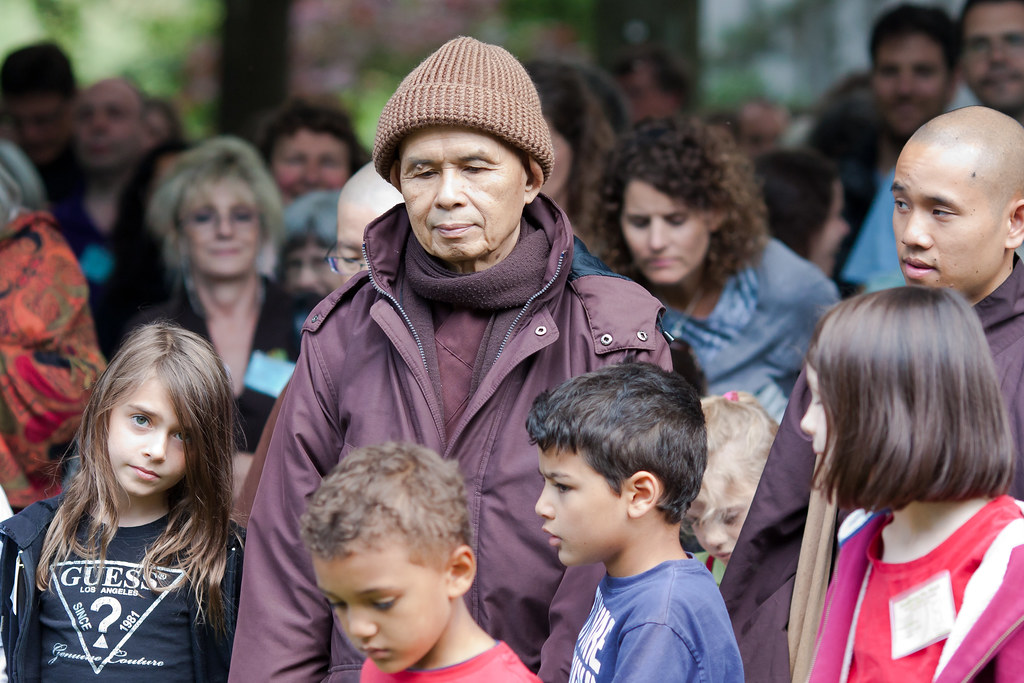January 30, 2021

Thich Nhat Hanh, the Vietnamese Zen Buddhist master, died this past week at the age of 95. He was much loved for his teaching of mindfulness, compassion and nonviolence. I have always appreciated the simple, yet profound, truths he was able to articulate in meaningful ways. More importantly, how authentically he walked the talk.
One of the lessons I continue to learn from Thich Nhat Hanh (it’s really a lifetime’s work, isn’t it?) is the importance of striving to understand the other person. It is so easy to dismiss or judge people when really we simply haven’t taken the time to understand them. And our modern communication forums like social media only amplify our tendency to “other” the other.
The habitual practice of othering trickles down to how we approach the children we are caring for. Looking back over my years as a caregiver of children, I can count far too many times in which I felt disconnected from a particular child (usually because of challenging behaviors that I didn’t know how to deal with), and I found myself thinking there must be something wrong with the child, or their home environment, or the media they were exposed to, or the way their parents negotiated with them, or the busy schedule their family kept, or… or… or… Over the years, I’ve learned that my quick judgments have rarely invited me to turn the gaze toward myself or how I might be contributing to the challenging dynamic at play. I’ve also learned that judgments don’t usually lead to a solution, because what I am not doing when I am so busy judging is showing sincere and genuine interest in the child.
When you plant lettuce, if it does not grow well, you don’t blame the lettuce. You look for reasons it is not doing well. It may need fertilizer, or more water, or less sun. You never blame the lettuce. Yet, if we have problems with our friends or family, we blame the other person. But if we know how to take care of them, they will grow well, like the lettuce. Blaming has no positive effect at all, nor does trying to persuade using reason and argument. That is my experience. No blame, no reasoning, no argument, just understanding. If you understand, and you show that you understand, you can love, and the situation will change.
-Thich Nhat Nanh
One of the many gifts I have received from LifeWays is the opportunity to learn how to observe children in a way that helps me understand them better. Once I step back and observe the child with interest and without judgment something shifts and I am able to better care for the child. In our “Learning to Observe Children” online course, we ask each student to choose a child to observe for the 2 1/2 weeks of the course. Many students have shared that simply by turning their loving, yet objective, gaze toward a particular child for a couple of weeks, they have developed a more compassionate interest in the child, and have noticed a stronger connection between them. Here are some of our online students’ reflections about the course:
This was a very pleasant and eye opening experience. I did not expect to gain such a profound new perspective on how to observe and engage, or even not engage, with children. This practice will definitely carry over into other aspects in my life as well.. So much food for thought. THANK YOU! -Evie
This course felt like it was speaking from the child. Therefore it leaves me with more understanding of children and their desire to be observed and supported as needed. Simply, genuine care and companionship. -Martha
I’ll be going back through this course a second time. The depth and insights are truly profound and awaken the spirit of caregiving in an entirely fresh light. -Rebecca
I really enjoy walking alongside our online students as we explore the topic of “Learning to Observe Children” because each time we go through the process together it helps me re-focus my attention on what is important — understanding the child. I still have a long way to go, and I suspect I’m not alone in that.
I hope you’ll consider joining us for “Learning to Observe Children” February 9-26th. We can support each other in this simple, yet profound practice. You can click on the link below for more information.
With all good wishes,

Mary O’Connell
Training Coordinator for LifeWays
This sounds like an excellent offering!
Will it be offered in Spanish or with Spanish translation?
Thanks for the suggestion, Wendy. This time it won’t be, but perhaps we can work on that for future offerings!